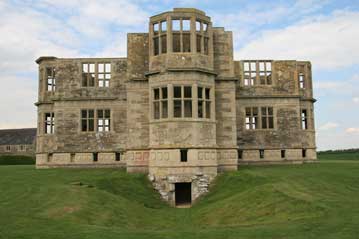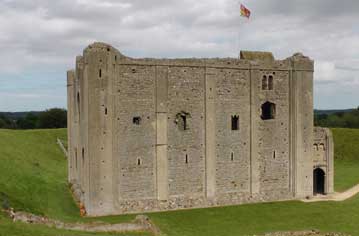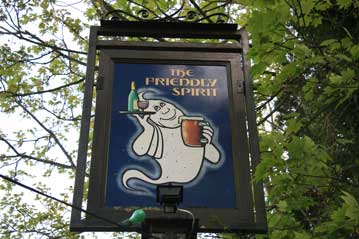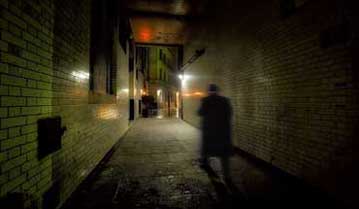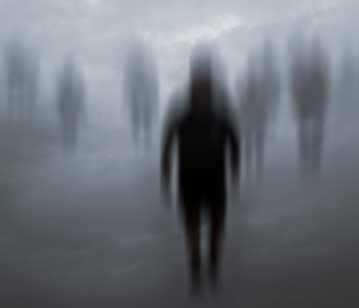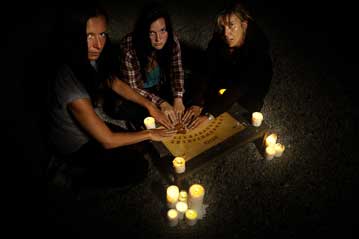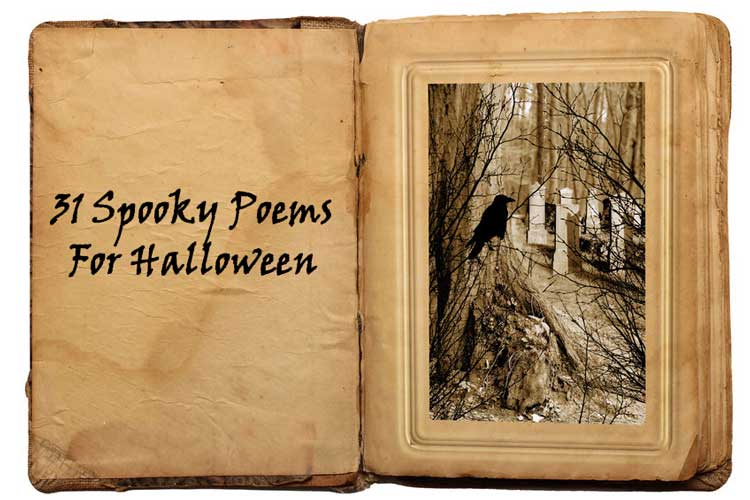
Turn The Lights Down Low
Halloween is the perfect night to gather by the light of a lone candle, or to sit by the flickering flame of a log fire and conjure up creepy images of ghosties and ghoulies, long-leggetie beasties, and things that go bump in the night.
Poetry can make an excellent mood setter for your ghostly gatherings, and below you will find some really atmospheric and spooky poems to get your Halloween celebrations well and truly underway.
There are poems about ghosts and witches, spirits and spectres, dead men coming back to avenge themselves upon the living, and numerous other nefarious and creepy scenarios.
When reciting these poems, it is suggested that you turn the lights down low - or, even better, switch them off altogether - and light a candle! Ensure that some suitably creepy music is playing softly in the background, and then start reading the poems aloud in a low, dramatic voice.
Let the words of each of the poems enthrall you, and let their suggestions of mysterious forces lurking in the darkness around you awaken those long suppressed primeval fears.
Scary Poems To Recite In The Dark
Below you will find 31 poems that are guaranteed to get Halloween off to a creepy and atmospheric start - as well as giving some of your listeners quite a start into the bargain!
So take a deep breath, steady your nerves, and then click on a poem of your choice.
Happy Halloween Reading.
THIS PLACE IS HAUNTED
By Richard Jones
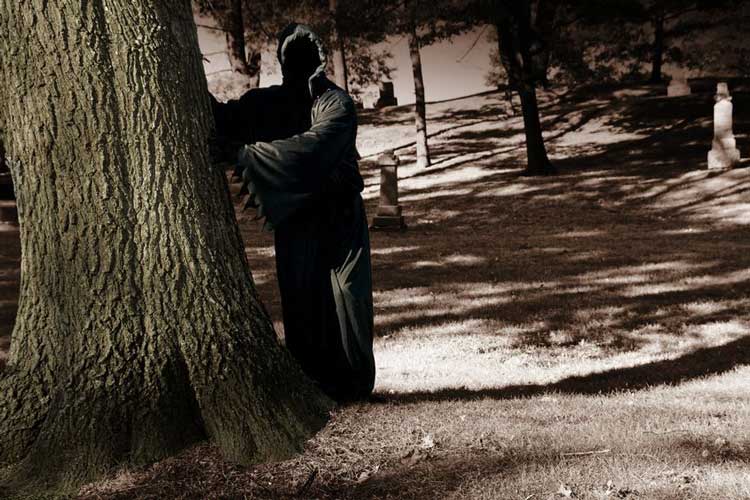
I
In screaming woods and empty rooms
or gloomy vaults and sunken tombs;
Where monks and nuns in dust decay
and shadows dance at close of day.
II
Where the bat dips on the wing
and spectral choirs on breezes sing;
Where swords of ancient battles clash
and shimmering shades for freedom dash.
III
Where raging storms at midnight howl
and distant rolls of thunder growl.
Where the hounds of hell take flight
and ghost clouds race across the night.
IV
Where silver webs of spiders weave
and star-crossed lovers take their leave.
Where curses lay the spirits low
and mortal footsteps fear to go.
V
Where death holds life in grim embrace
its lines etched on the sinner's face.
Where e'er the march of time is flaunted
voices cry - "this place is haunted."
© (1999) Richard Jones
All rights reserved.
THE GHOST
By Richard Jones
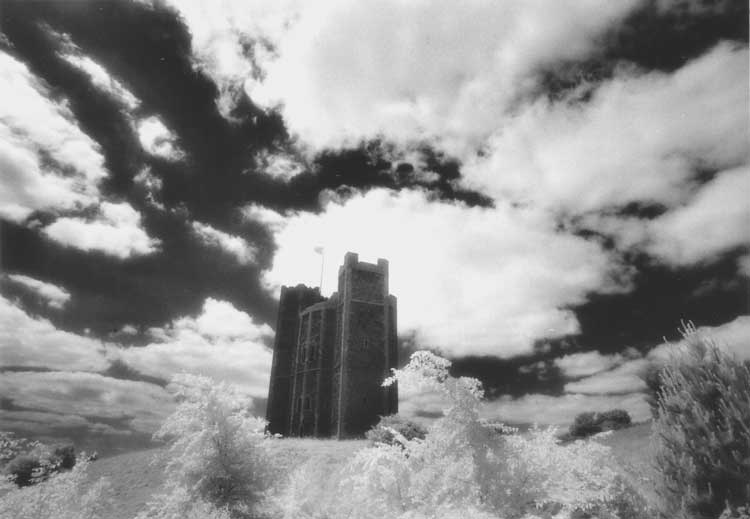
I
I live in a house with no windows
a black curtain hangs on my door.
The voices of conscience torment me
I live in a room with no floor.
II
There's dirt in the corner I can't see
there's water that runs down the wall.
There're mice in the attic above me
and rats playing games in the hall.
III
I live in a house with no windows
and sleep in a room with no heat.
The darkness of life that surrounds me
Keeps out the sounds of the street.
IV
I wake when the shadows have fallen
and walk when the memories cease.
When purpose in life has no meaning
and only the wicked find peace.
V
Each night you sense that I'm by you
you feel my breath as you sleep.
You hear the faint creak of the floorboards
as out from the shadows I creep.
VI
I live in a house with no windows
I live in a house that's now yours
It's my voice you think that you're hearing
for I died in this room with no doors.
© (1997) Richard Jones
All rights reserved.
FROM THE HAND OF GLORY
By R. H. Barham
(1788 - 1845)
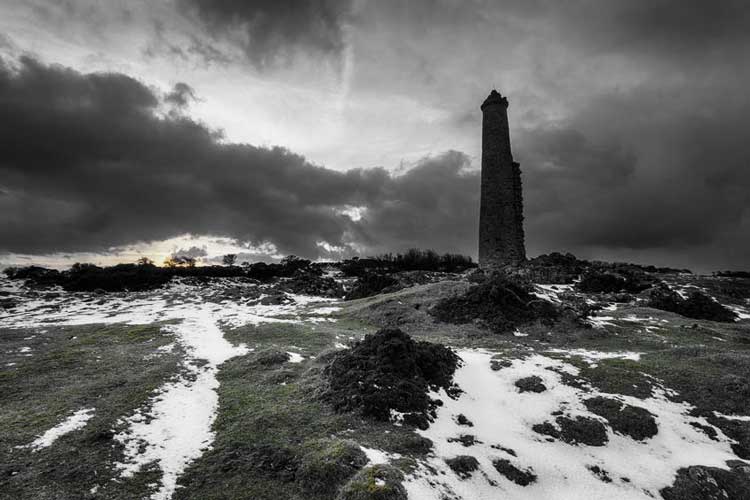
On the lone bleak moor, at the midnight hour
Beneath the Gallows Tree
Hand in hand, The Murderers stand
By one, by two, or three!
And the Moon that night, With a grey, cold light
Each baleful object tips;
One half of her form, Is seen through the storm
The other half's hid in Eclipse!
And the cold wind howls, And the Thunder growls
And the Lightning is broad and bright;
And altogether, It's very bad weather
And an unpleasant sort of a night!
FROM OEDIPUS
By John Dryden and Nathaniel Lee
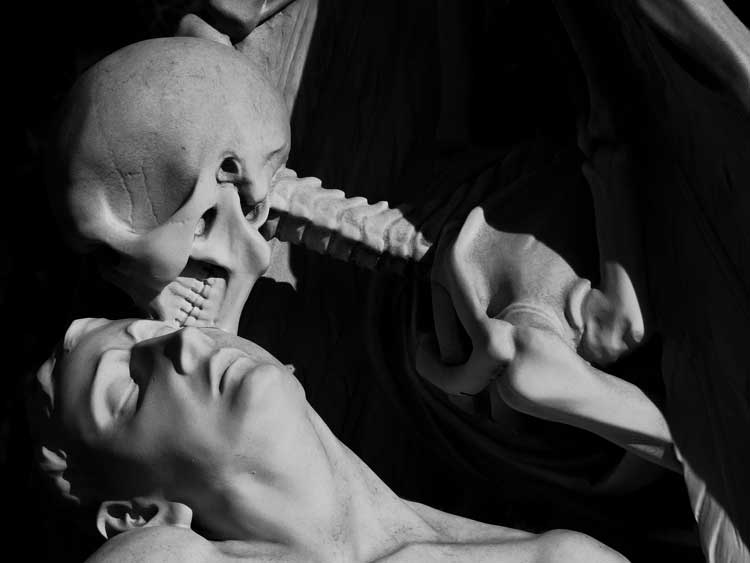
O 'tis a fearful thing to be no more;
Or if to be, to wander after death;
To walk as Spirits do, in Brakes all day;
And when the darkness comes
to glide in paths
That lead to graves: and in the silent Vault,
Where lyes your own pale shrowd,
to hover o'er it,
Striving to enter your forbidden Corps;
And often, often, vainly breathe your Ghost
Into your lifeless lips.
FROM THE LADY OF THE MANOR
By George Crabbe
(1754 - 1832)
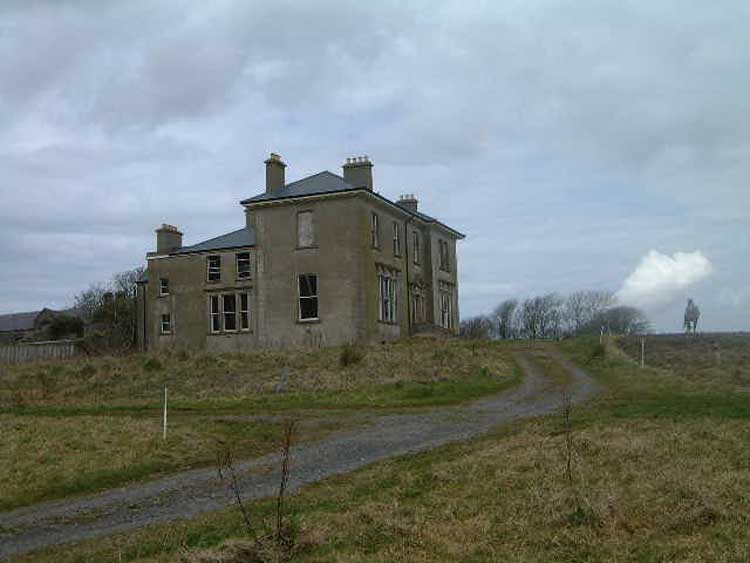
Next died the Lady who yon Hall possessed;
And here they brought her noble bones to rest.
In Town she dwelt:- forsaken stood the Hall:
Worms ate the floors, the tapestry fled the wall:
No fire the kitchens cheerless grate displayed;
No cheerful light the long-closed sash conveyed;
The crawling worm, that turns a summer-fly,
Here spun his shroud and laid him up to die
The winter-death:- upon the bed of sate,
The bat shrill-shrieking wooed his flickering mate;
To empty rooms the curious came no more,
From empty cellars turned the angry poor,
And surly beggars cursed the ever-bolted door.
THE APPARITION
By John Donne
(1572 - 1631)
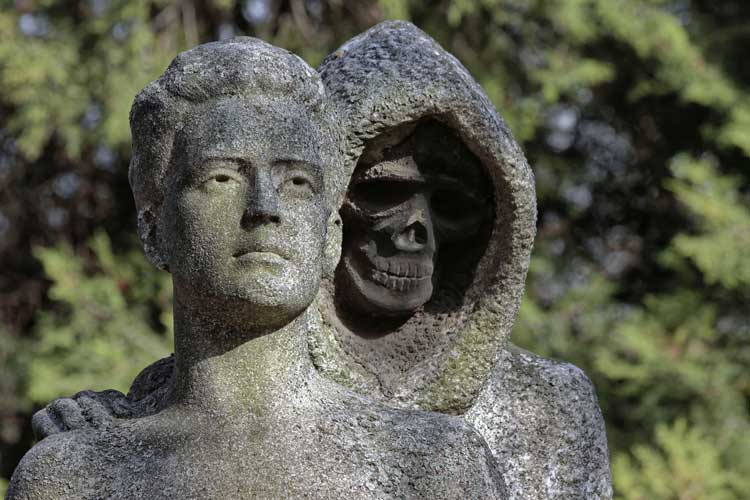
When by thy scorn, O murd'ress, I am dead
And that thou think'st thee free
From all solicitation from me
Then shall my ghost come to thy bed
And thee, feign'd vestal, in worse arms shall see;
Then thy sick taper will begin to wink
And he, whose thou art then, being tir'd before
Will, if thou stir, or pinch to wake him, think
Thou call'st for more
And in false sleep will from thee shrink;
And then, poor aspen wretch, neglected thou
Bath'd in a cold quicksilver sweat wilt lie
A verier ghost than I.
What I will say, I will not tell thee now
Lest that preserve thee; and since my love is spent
I'had rather thou shouldst painfully repent
Than by my threat'nings rest still innocent.
FROM THE HAUNTED PALACE
By Edgar Allan Poe
(1809 - 1849)
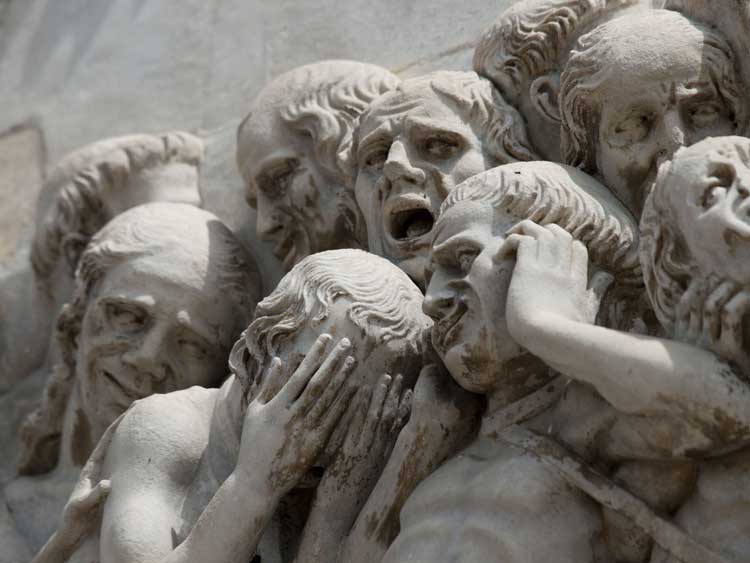
And travellers, now, within that valley
Through the red-litten windows see
Vast forms, that move fantastically
To a discordant melody
While, like a ghastly rapid river
Through the pale door
A hideous throng rush out forever
And laugh - but smile no more.
THE NEW HOUSE
By Edward Thomas
(1878 - 1917)
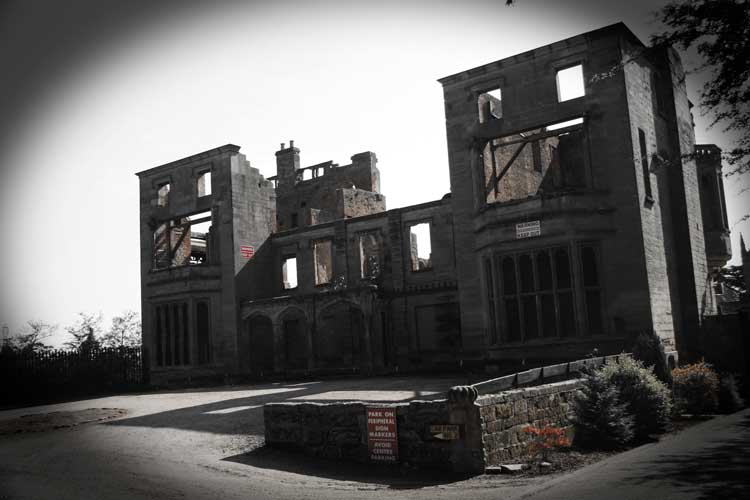
Now first, as I shut the door
I was alone
In the new house; and the wind
Began to moan.
Old at once was the house
And I was old;
My ears were teased with the dread
Of what was foretold,
Nights of storm, days of mist, without end;
Sad days when the sun
Shone in vain: old griefs and griefs
Not yest begun.
All was foretold me; naught
Could I foresee;
But I learnt how the wind would sound
After these things should be.
FROM STONEHENGE
By Thomas Stokes Salmon
(1823)
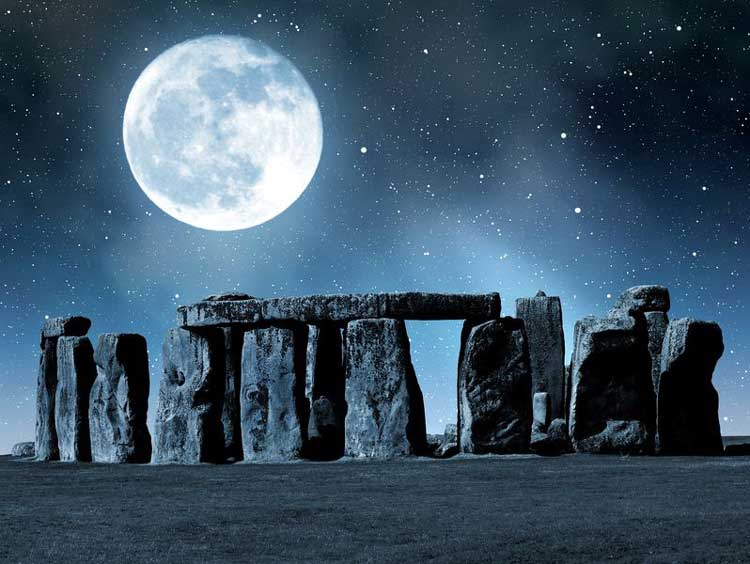
Whence the poised fragment tottering seems to throw
A trembling shadow on the plain below
Here oft, when evening sheds her twilight ray
And gilds with fainter beam departing day
With breathless gaze, and cheek with terror pale
The lingering shepherd startles at the tale
How at deep midnight by the moon’s chill glance
Unearthly forms prolong the viewless dance;
While on each whispering breeze that murmurs by
His busied fancy hears the hollow sigh.
FROM THE CITY OF DREADFUL NIGHT
By James Thomson (B. V.)
(1834 - 1882)
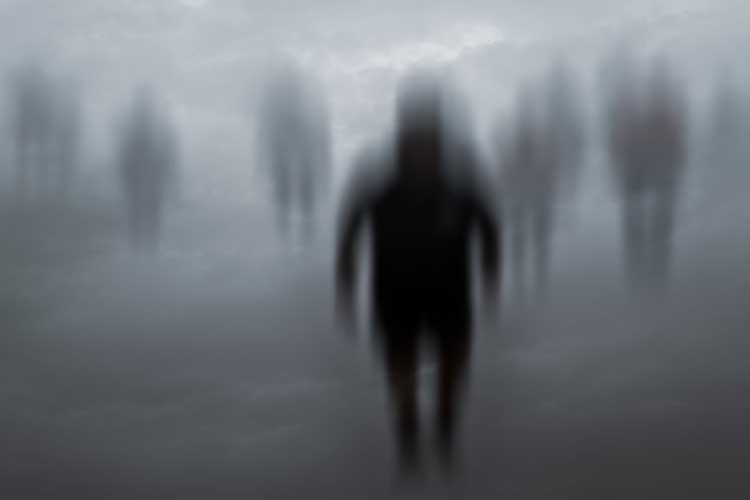
The City is of Night, but not of Sleep;
There sweet sleep is not for the weary brain;
The pitiless hours like years and ages creep
A night seems termless hell. This dreadful strain
Of thought and consciousness which never ceases
Or which some moments' stupor but increases
This, worse than woe, makes wretches there insane.
They leave all hope behind who enter there:
One certitude while sane they cannot leave
One anodyne for torture and despair;
The certitude of Death, which no reprieve
Can put off long; and which, divinely tender
But waits the outstretched hand to promptly render
That draught whose slumber nothing can bereave.
THE STOLEN CHILD
By W. B. Yeats
(1865 - 1939)

Where dips the rocky highland
Of Sleuth Wood in the lake
There lies a leafy island
Where flapping herons wake
The drowsy water rats;
There we've hid our faery vats
Full of berrys
And of reddest stolen cherries.
Come away, O human child!
To the waters and the wild
With a faery, hand in hand
For the world's more full of weeping
than you can understand.
Where the wave of moonlight glosses
The dim gray sands with light
Far off by furthest Rosses
We foot it all the night
Weaving olden dances
Mingling hands and mingling glances
Till the moon has taken flight;
To and fro we leap
And chase the frothy bubbles
While the world is full of troubles
And anxious in its sleep.
Come away, O human child!
To the waters and the wild
With a faery, hand in hand
For the world's more full of weeping
than you can understand.
Where the wandering water gushes
From the hills above Glen-Car
In pools among the rushes
That scarce could bathe a star
We seek for slumbering trout
And whispering in their ears
Give them unquiet dreams;
Leaning softly out
From ferns that drop their tears
Over the young streams.
Come away, O human child!
To the waters and the wild
With a faery, hand in hand
For the world's more full of weeping
than you can understand.
Away with us he's going,
The solemn-eyed:
He'll hear no more the lowing
Of the calves on the warm hillside
Or the kettle on the hob
Sing peace into his breast
Or see the brown mice bob
Round and round the oatmeal chest.
For he comes, the human child
To the waters and the wild
With a faery, hand in hand
For the world's more full of weeping
than he can understand.
THE HAUNTED OAK
By Paul Laurence Dunbar
(1872 - 1906)
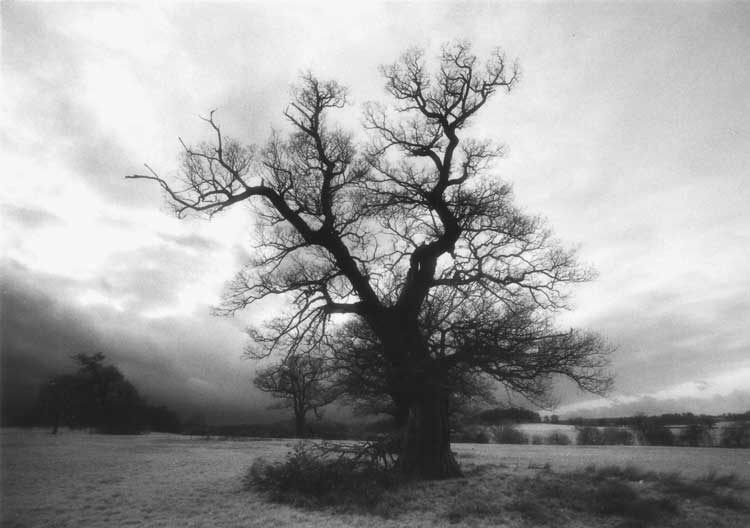
Pray why are you so bare, so bare
Oh, bough of the old oak-tree;
And why, when I go through the shade you throw
Runs a shudder over me?
My leaves were green as the best, I trow
And sap ran free in my veins
But I saw in the moonlight dim and weird
A guiltless victim's pains.
I bent me down to hear his sigh;
I shook with his gurgling moan
And I trembled sore when they rode away
And left him here alone.
They'd charged him with the old, old crime
And set him fast in jail:
Oh, why does the dog howl all night long
And why does the night wind wail?
He prayed his prayer and he swore his oath
And he raised his hand to the sky;
But the beat of hoofs smote on his ear
And the steady tread drew nigh.
Who is it rides by night, by night
Over the moonlit road?
And what is the spur that keeps the pace
What is the galling goad?
And now they beat at the prison door
"Ho, keeper, do not stay!
We are friends of him whom you hold within
And we fain would take him away
From those who ride fast on our heels
With mind to do him wrong;
They have no care for his innocence
And the rope they bear is long."
They have fooled the jailer with lying words
They have fooled the man with lies;
The bolts unbar, the locks are drawn
And the great door open flies.
Now they have taken him from the jail
And hard and fast they ride
And the leader laughs low down in his throat
As they halt my trunk beside.
Oh, the judge, he wore a mask of black
And the doctor one of white
And the minister, with his oldest son
Was curiously bedight.
Oh, foolish man, why weep you now?
'Tis but a little space
And the time will come when these shall dread
The mem'ry of your face.
I feel the rope against my bark
And the weight of him in my grain
I feel in the throe of his final woe
The touch of my own last pain.
And never more shall leaves come forth
On the bough that bears the ban;
I am burned with dread, I am dried and dead
From the curse of a guiltless man.
And ever the judge rides by, rides by
And goes to hunt the deer
And ever another rides his soul
In the guise of a mortal fear.
And ever the man he rides me hard
And never a night stays he;
For I feel his curse as a haunted bough
On the trunk of a haunted tree.
FROM THE HAUNTED WOOD
By Isaac McLellan
(1806 - 1899)
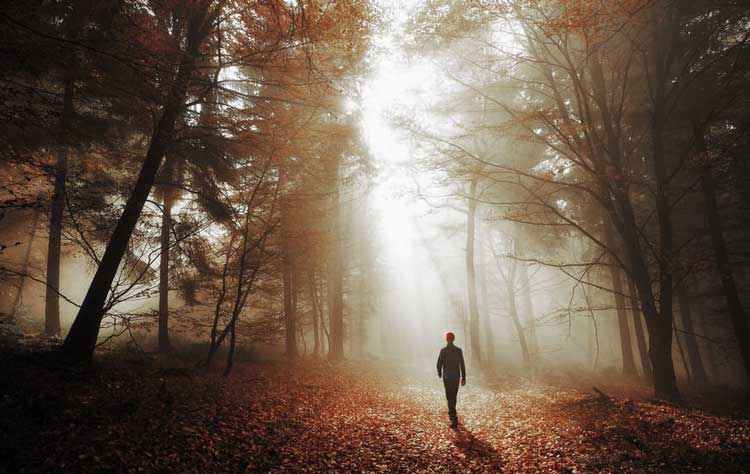
It is said that the Spirits of buried men
Oft come to this wicked world again;
That the churchyard turf is often trod
By the unlaid tenants of tomb and sod.
That the midnight sea itself is swept
By those who have long beneath it slept.
And they say of this old, mossy wood
Whose hoary trunks have for ages stood
That every knoll and dim-lit glade
Is haunted at night by its restless Shade.
THE FAIRIES
By William Allingham
(1824 - 1889)
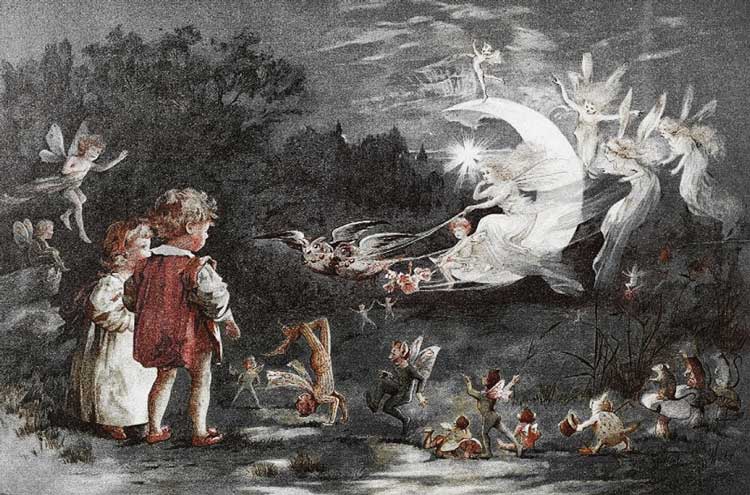
Up the airy mountain
Down the rushy glen
We daren't go a-hunting
For fear of little men;
Wee folk, good folk
Trooping all together;
Green jacket, red cap
And white owl's feather!
Down along the rocky shore
Some make their home
They live on crispy pancakes
Of yellow tide-foam;
Some in the reeds
Of the black mountain-lake
With frogs for their watchdogs
All night awake.
High on the hill-top
The old King sits;
He is now so old and grey
He's nigh lost his wits.
With a bridge of white mist
Columbkill he crosses
On his stately journeys
From Slieveleague to Rosses;
Or going up with the music
On cold starry nights
To sup with the Queen
Of the gay Northern Lights.
They stole little Bridget
For seven years long;
When she came down again
Her friends were all gone.
They took her lightly back
Between the night and morrow
They thought that she was fast asleep
But she was dead with sorrow.
They have kept her ever since
Deep within the lake
On a bed of fig-leaves
Watching till she wake.
By the craggy hillside
Through the mosses bare
They have planted thorn trees
For my pleasure, here and there.
Is any man so daring
As dig them up in spite
He shall find their sharpest thorns
In his bed at night.
Up the airy mountain
Down the rushy glen
We daren't go a-hunting
For fear of little men;
Wee folk, good folk
Trooping all together;
Green jacket, red cap
And white owl's feather!
THE LAKE OF THE DISMAL SWAMP
By Thomas Moore
(1779 - 1852)
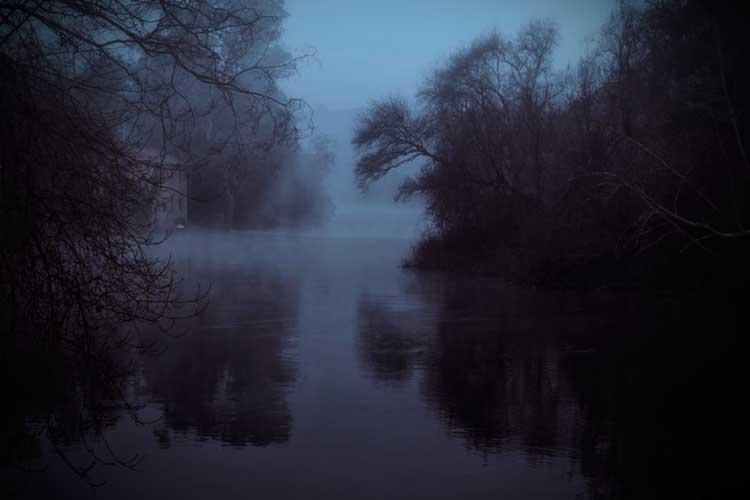
"They made her a grave, too cold and damp
For a soul so warm and true;
And she's gone to the Lake of the Dismal Swamp
Where, all night long, by a fire-fly lamp
She paddles her white canoe."
"And her fire-fly lamp I soon shall see
And her paddle I soon shall hear;
Long and loving our life shall be
And I'll hide the maid in a cypress tree
When the footstep of death is near."
Away to the Dismal Swamp he speeds -
His path was rugged and sore
Through tangled juniper, beds of reeds
Through many a fen where the serpent feeds
And man never trod before.
And when on the earth he sunk to sleep
If slumber his eyelids knew
He lay where the deadly vine doth weep
Its venomous tear and nightly steep
The flesh with blistering dew!
And near him the she-wolf stirr'd the brake
And the copper-snake breath'd in his ear
Till he starting cried, from his dream awake
"Oh! when shall I see the dusky Lake
And the white canoe of my dear?"
He saw the Lake, and a meteor bright
Quick over its surface play'd -
"Welcome," he said, "my dear one's light!"
And the dim shore echoed for many a night
The name of the death-cold maid.
Till he hollow'd a boat of the birchen bark
Which carried him off from shore;
Far, far he follow'd the meteor spark
The wind was high and the clouds were dark
And the boat return'd no more.
But oft, from the Indian hunter's camp
This lover and maid so true
Are seen at the hour of midnight damp
To cross the Lake by a fire-fly lamp
And paddle their white canoe!
THE UNRETURNED
By Wilfred Owen
(1893 - 1918)
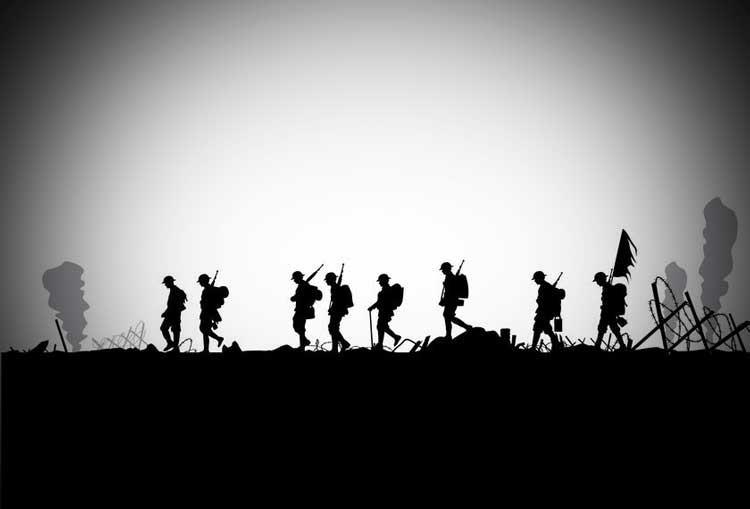
Suddenly night crushed out the day and hurled
Her remnants over cloud-peaks, thunder-walled.
Then fell a stillness such as harks appalled
When far-gone dead return upon the world.
There watched I for the Dead; but no ghost woke.
Each one whom Life exiled I named and called.
But they were all too far, or dumbed, or thralled
And never one fared back to me or spoke.
Then peered the indefinite unshapen dawn
With vacant gloaming, sad as half-lit minds
The weak-limned hour when sick men's sighs are drained.
And while I wondered on their being withdrawn
Gagged by the smothering Wing which none unbinds
I dreaded even a heaven with doors so chained.
THE POOR GHOST
By Christina Georgina Rossetti
(1830 - 1894)
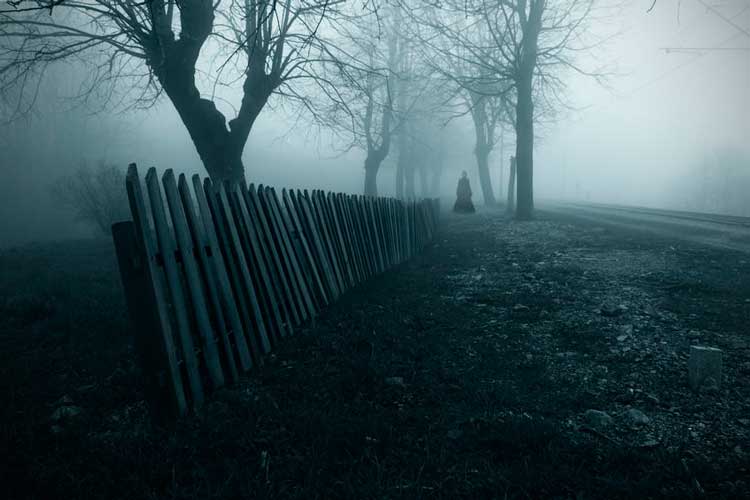
"Oh whence do you come, my dear friend, to me
With your golden hair all fallen below your knee
And your face as white as snowdrops on the lea
And your voice as hollow as the hollow sea?"
"From the other world I come back to you
My locks are uncurled with dripping drenching dew.
You know the old, whilst I know the new:
But to-morrow you shall know this too."
"Oh not to-morrow into the dark, I pray;
Oh not to-morrow, too soon to go away:
Here I feel warm and well-content and gay:
Give me another year, another day."
"Am I so changed in a day and a night
That mine own only love shrinks from me with fright
Is fain to turn away to left or right
And cover up his eyes from the sight?"
"Indeed I loved you, my chosen friend
I loved you for life, but life has an end;
Through sickness I was ready to tend:
But death mars all, which we cannot mend."
"Indeed I loved you; I love you yet
If you will stay where your bed is set
Where I have planted a violet
Which the wind waves, which the dew makes wet."
"Life is gone, then love too is gone
It was a reed that I leant upon:
Never doubt I will leave you alone
And not wake you rattling bone with bone. "
"I go home alone to my bed
Dug deep at the foot and deep at the head
Roofed in with a load of lead
Warm enough for the forgotten dead."
"But why did your tears soak through the clay
And why did your sobs wake me where I lay?
I was away, far enough away:
Let me sleep now till the Judgment Day."
BEYOND THE LAST LAMP
Near Tooting Common
By Thomas Hardy
(1840 - 1928)
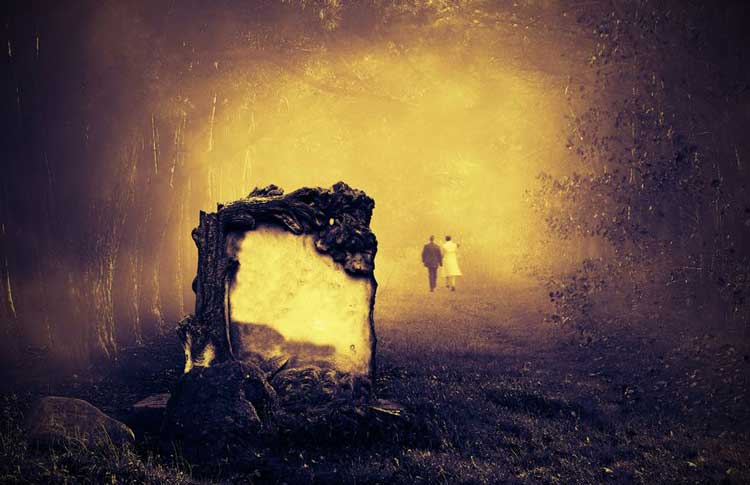
While rain, with eve in partnership
Descended darkly, drip, drip, drip
Beyond the last lone lamp I passed
Walking slowly, whispering sadly
Two linked loiterers, wan, downcast:
Some heavy thought constrained each face
And blinded them to time and place.
The pair seemed lovers, yet absorbed
In mental scenes no longer orbed
By love's young rays. Each countenance
As it slowly, as it sadly
Caught the lamplight's yellow glance
Held in suspense a misery
At things which had been or might be.
When I retrod that watery way
Some hours beyond the droop of day
Still I found pacing there the twain
Just as slowly, just as sadly
Heedless of the night and rain.
One could but wonder who they were
And what wild woe detained them there.
Though thirty years of blur and blot
Have slid since I beheld that spot
And saw in curious converse there
Moving slowly, moving sadly
That mysterious tragic pair
Its olden look may linger on -
All but the couple; they have gone.
Whither? Who knows, indeed ... And yet
To me, when nights are weird and wet
Without those comrades there at tryst
Creeping slowly, creeping sadly
That lone lane does not exist.
There they seem brooding on their pain
And will, while such a lane remain.
SONG OF THE WITCHES
From Macbeth
By William Shakespeare
(1564 - 1616)
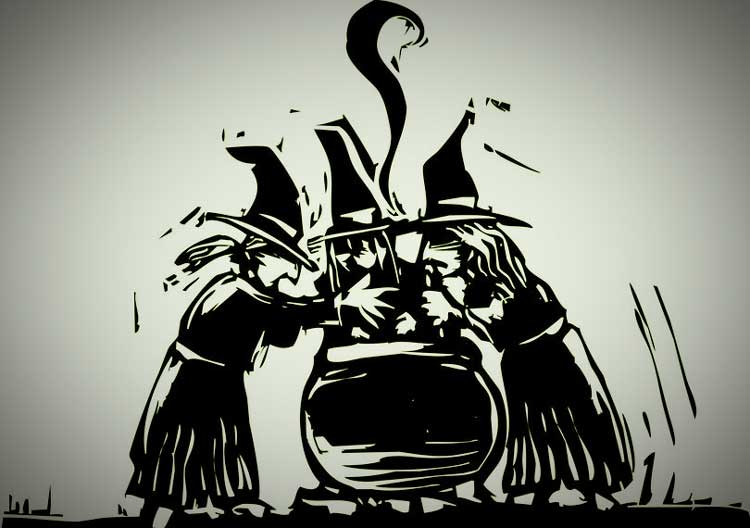
Thrice the brinded cat hath mew'd.
Thrice and once the hedge-pig whined.
Harpier cries "'Tis time, 'tis time."
Round about the cauldron go;
In the poison'd entrails throw.
Toad, that under cold stone
Days and nights has thirty-one
Swelter'd venom sleeping got
Boil thou first i' the charmed pot.
Double, double, toil and trouble;
Fire burn, and cauldron bubble.
Fillet of a fenny snake
In the cauldron boil and bake;
Eye of newt and toe of frog
Wool of bat and tongue of dog
Adder's fork and blind-worm's sting
Lizard's leg and howlet's wing
For a charm of powerful trouble
Like a hell-broth boil and bubble.
Double, double, toil and trouble;
Fire burn, and cauldron bubble.
Cool it with a baboon's blood
Then the charm is firm and good.
By the pricking of my thumbs
Something wicked this way comes.
THIS LIVING HAND
By John Keats
(1795 - 1821)

This living hand, now warm and capable
Of earnest grasping, would, if it were cold
And in the icy silence of the tomb
So haunt thy days and chill thy dreaming nights
That thou would wish thine own heart dry of blood
So in my veins red life might stream again
And thou be conscience-calm'd - see here it is -
I hold it towards you.
DEAD MAN'S HATE
By Robert Ervin Howard
(1906 - 1936)
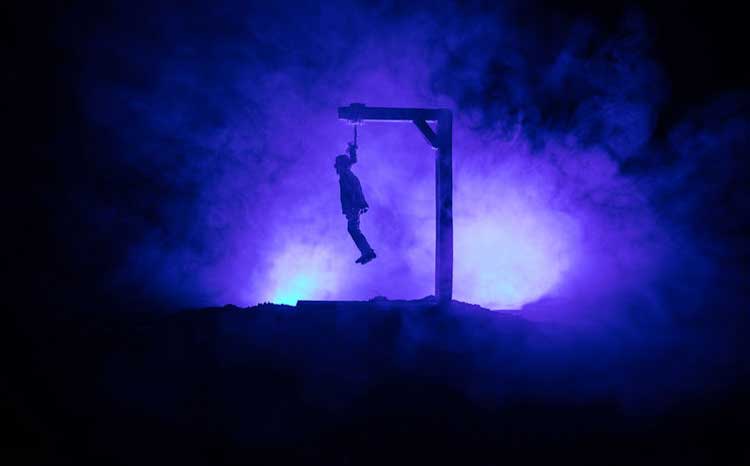
They hanged John Farrel in the dawn
amid the marketplace;
At dusk came Adam Brand to him
and spat upon his face.
"Ho neighbors all," spake Adam Brand
"see ye John Farrel's fate!
'Tis proven here a hempen noose
is stronger than man's hate!
For heard ye not John Farrel's vow
to be avenged upon me
Come life or death? See how he hangs
high on the gallows tree!"
Yet never a word the people spoke
in fear and wild surprise
For the grisly corpse raised up its head
and stared with sightless eyes.
And with strange motions, slow and stiff
pointed at Adam Brand
And clambered down the gibbet tree
the noose within its hand.
With gaping mouth stood Adam Brand
like a statue carved of stone
Till the dead man laid a clammy hand
hard on his shoulder bone.
Then Adam shrieked like a soul in hell;
the red blood left his face
And he reeled away in a drunken run
through the screaming market place;
And close behind, the dead man came
with a face like a mummy's mask
And the dead joints cracked and the stiff legs creaked
with their unwonted task.
Men fled before the flying twain
or shrank with bated breath
And they saw on the face of Adam Brand
the seal set there by death.
He reeled on buckling legs that failed
yet on and on he fled;
So through the shuddering market-place
the dying fled the dead.
At the riverside fell Adam Brand
with a scream that rent the skies;
Across him fell John Farrel's corpse
nor ever the twain did rise.
There was no wound on Adam Brand
but his brow was cold and damp
For the fear of death had blown out his life
as a witch blows out a lamp.
His lips were writhed in a horrid grin
like a fiend's on Satan's coals
And the men that looked on his face that day
his stare still haunts their souls.
Such was the fate of Adam Brand
a strange, unearthly fate;
For stronger than death or hempen noose
are the fires of a dead man's hate.
THE WITCH
By Mary Elizabeth Coleridge
(1861 - 1907)
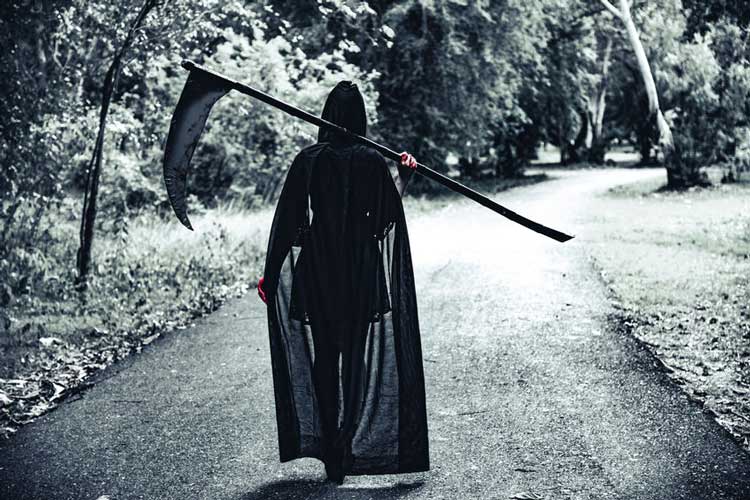
I have walked a great while over the snow
And I am not tall nor strong.
My clothes are wet, and my teeth are set
And the way was hard and long.
I have wandered over the fruitful earth
But I never came here before.
Oh, lift me over the threshold, and let me in at the door!
The cutting wind is a cruel foe.
I dare not stand in the blast.
My hands are stone, and my voice a groan
And the worst of death is past.
I am but a little maiden still
My little white feet are sore.
Oh, lift me over the threshold, and let me in at the door!
Her voice was the voice that women have
Who plead for their heart's desire.
She came - she came - and the quivering flame
Sunk and died in the fire.
It never was lit again on my hearth
Since I hurried across the floor
To lift her over the threshold, and let her in at the door.
HALLOWE'EN
By John Kendrick Bangs
(1862 - 1922)
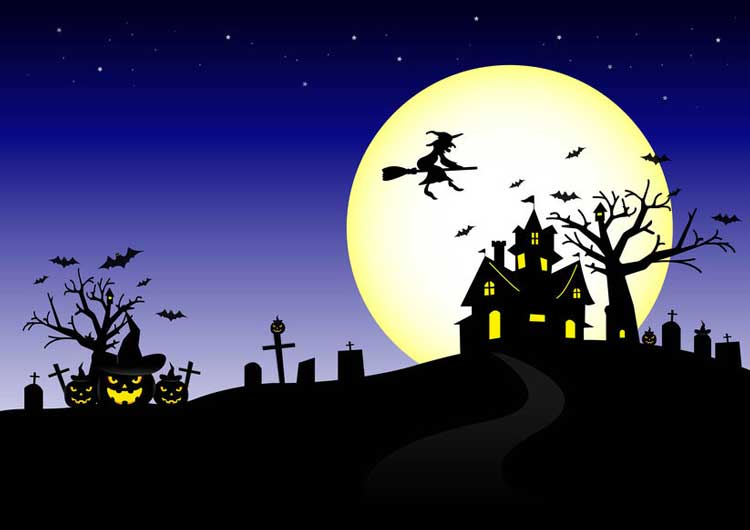
Bring forth the raisins and the nuts -
To-night All Hallows' Spectre struts
Along the moonlit way.
No time is this for tear or sob
Or other woes our joys to rob
But time for Pippin and for Bob
And Jack-o'-lantern gay.
Come forth, ye lass and trousered kid
From prisoned mischief raise the lid
And lift it good and high
Leave grave old Wisdom in the lurch
Set folly on a lofty perch
Nor fear the awesome rod of birch
When dawn illumes the sky.
'Tis night for revel, set apart
To reillume the darkened heart
And rout the hosts of Dole.
'Tis night when Goblin, Elf, and Fay
Come dancing in their best array
To prank and royster on the way
And ease the troubled soul.
The ghosts of all things past parade
Emerging from the mist and shade
That hid them from our gaze
And, full of song and ringing mirth
In one glad moment of rebirth
And again they walk the ways of earth
As in the ancient days.
The beacon light shines on the hill
The will-o'-wisps the forests fill
With flashes filched from noon;
And witches on their broomsticks spry
Speed here and yonder in the sky
And lift their strident voices high
Unto the Hunter's Moon.
The air resounds with tuneful notes
From myriads of straining throats
All hailing Folly Queen;
So join the swelling choral throng
Forget your sorrow and your wrong
In one glad hour of joyous song
To honor Hallowe'en!
THE HAG
By Robert Herrick
(1591 - 1674)
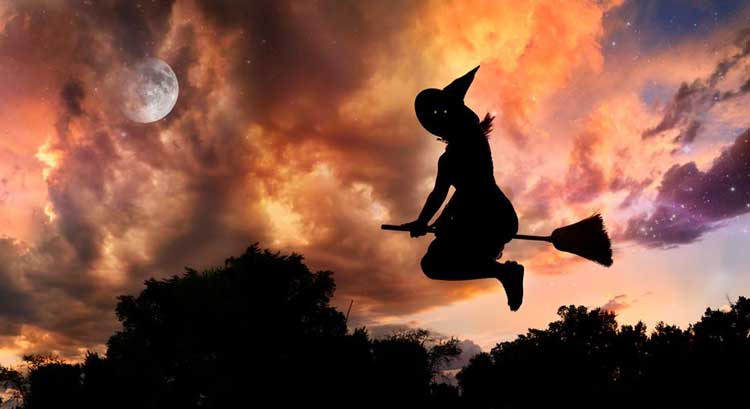
The Hag is astride
This night for to ride;
The Devill and shee together:
Through thick, and through thin
Now out, and then in
Though ne'r so foule be the weather.
A Thorn or a Burr
She takes for a Spurre:
With a lash of a Bramble she rides now
Through Brakes and through Bryars
O're Ditches, and Mires
She followes the Spirit that guides now.
No Beast, for his food
Dares now range the wood;
But husht in his laire he lies lurking:
While mischeifs, by these
On Land and on Seas
At noone of Night are working.
The storme will arise
And trouble the skies;
This night, and more for the wonder
The ghost from the Tomb
Affrighted shall come
Cal'd out by the clap of the Thunder.
HAUNTED HOUSES
By Henry Wadsworth Longfellow
(1807 - 1882)
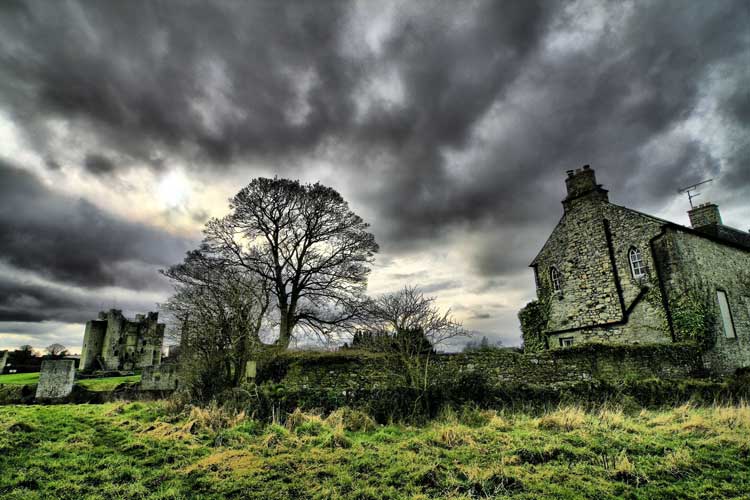
All houses wherein men have lived and died
Are haunted houses. Through the open doors
The harmless phantoms on their errands glide
With feet that make no sound upon the floors.
We meet them at the door-way, on the stair
Along the passages they come and go
Impalpable impressions on the air
A sense of something moving to and fro.
There are more guests at table than the hosts
Invited; the illuminated hall
Is thronged with quiet, inoffensive ghosts
As silent as the pictures on the wall.
The stranger at my fireside cannot see
The forms I see, nor hear the sounds I hear;
He but perceives what is; while unto me
All that has been is visible and clear.
We have no title-deeds to house or lands;
Owners and occupants of earlier dates
From graves forgotten stretch their dusty hands
And hold in mortmain still their old estates.
The spirit-world around this world of sense
Floats like an atmosphere, and everywhere
Wafts through these earthly mists and vapours dense
A vital breath of more ethereal air.
Our little lives are kept in equipoise
By opposite attractions and desires;
The struggle of the instinct that enjoys
And the more noble instinct that aspires.
These perturbations, this perpetual jar
Of earthly wants and aspirations high
Come from the influence of an unseen star
An undiscovered planet in our sky.
And as the moon from some dark gate of cloud
Throws o'er the sea a floating bridge of light
Across whose trembling planks our fancies crowd
Into the realm of mystery and night.
So from the world of spirits there descends
A bridge of light, connecting it with this,
O'er whose unsteady floor, that sways and bends
Wander our thoughts above the dark abyss.
FROM THE RIME OF THE ANCIENT MARINER
By Samuel Taylor Coleridge
(1772 - 1834)

The loud wind never reached the ship
Yet now the ship moved on!
Beneath the lightning and the Moon
The dead men gave a groan.
They groaned, they stirred, they all uprose
Nor spake, nor moved their eyes;
It had been strange, even in a dream
To have seen those dead men rise.
The helmsman steered, the ship moved on;
Yet never a breeze up-blew;
The mariners all 'gan work the ropes
Where they were wont to do;
They raised their limbs like lifeless tools -
We were a ghastly crew.
The body of my brother's son
Stood by me, knee to knee:
The body and I pulled at one rope
But he said nought to me.
"I fear thee, ancient Mariner!"
Be calm, thou Wedding-Guest!
'Twas not those souls that fled in pain
Which to their corses came again
But a troop of spirits blest:
For when it dawned - they dropped their arms
And clustered round the mast;
Sweet sounds rose slowly through their mouths
And from their bodies passed.
SIBILLA'S DIRGE
By Thomas Lovell Beddoes
(1803 - 1849)
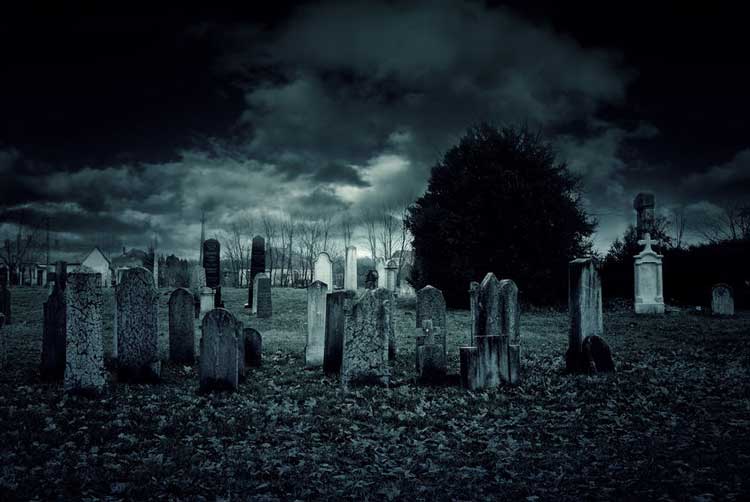
We do lie beneath the grass
In the moonlight, in the shade
Of the yew-tree. They that pass
Hear us not. We are afraid
They would envy our delight
In our graves by glow-worm night.
Come follow us, and smile as we;
We sail to the rock in the ancient waves
Where the snow falls by thousands into the sea
And the drown'd and the shipwreck'd have happy graves.
SPELLBOUND
By Emily Bronte
(1818 - 1848)
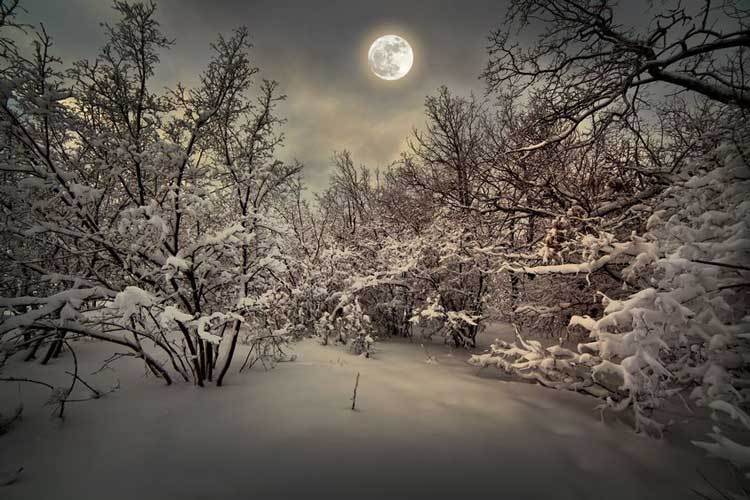
The night is darkening round me
The wild winds coldly blow;
But a tyrant spell has bound me
And I cannot, cannot go.
The giant trees are bending
Their bare boughs weighed with snow.
And the storm is fast descending
And yet I cannot go.
Clouds beyond clouds above me
Wastes beyond wastes below;
But nothing drear can move me;
I will not, cannot go.
THE LISTENERS
By Walter De La Mare
(1873 - 1936)
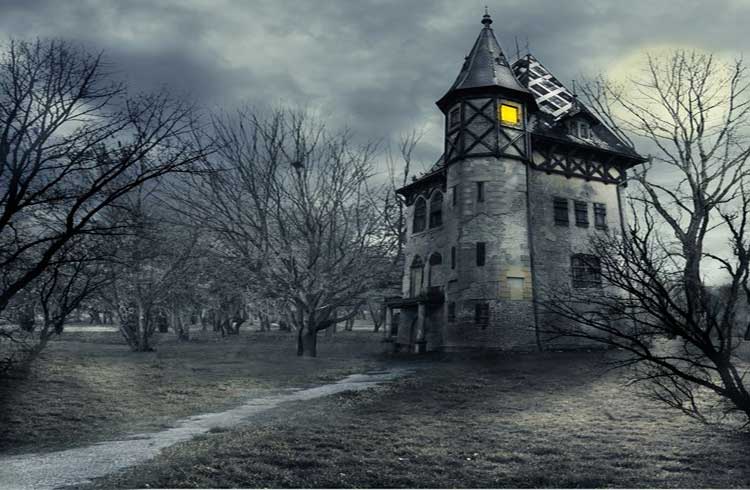
"Is there anybody there?" said the Traveller
Knocking on the moonlit door;
And his horse in the silence champed the grasses
Of the forest's ferny floor:
And a bird flew up out of the turret
Above the Traveller's head:
And he smote upon the door again a second time;
"Is there anybody there?" he said.
But no one descended to the Traveller;
No head from the leaf-fringed sill
Leaned over and looked into his grey eyes
Where he stood perplexed and still.
But only a host of phantom listeners
That dwelt in the lone house then
Stood listening in the quiet of the moonlight
To that voice from the world of men:
Stood thronging the faint moonbeams on the dark stair
That goes down to the empty hall
Hearkening in an air stirred and shaken
By the lonely Traveller's call.
And he felt in his heart their strangeness
Their stillness answering his cry
While his horse moved, cropping the dark turf
'Neath the starred and leafy sky;
For he suddenly smote on the door, even
Louder, and lifted his head:-
"Tell them I came, and no one answered
That I kept my word," he said.
Never the least stir made the listeners
Though every word he spake
Fell echoing through the shadowiness of the still house
From the one man left awake:
Ay, they heard his foot upon the stirrup
And the sound of iron on stone
And how the silence surged softly backward
When the plunging hoofs were gone.
MARY'S GHOST
A Pathetic Ballad
By Thomas Hood
(1799 - 1845)
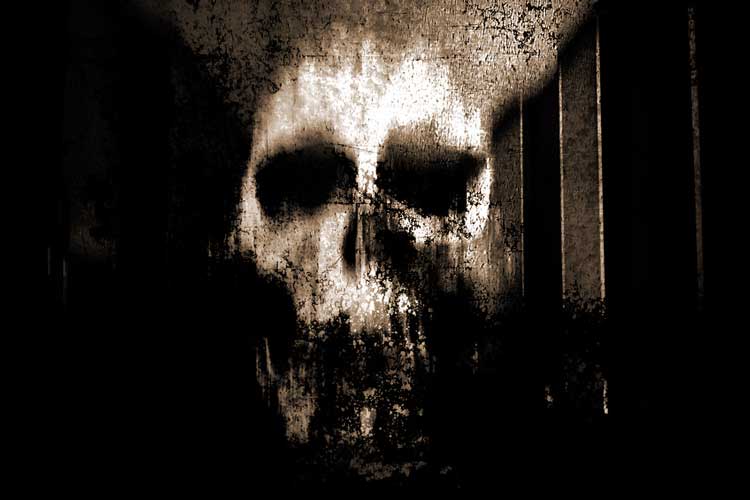
'Twas in the middle of the night
To sleep young William tried
When Mary's ghost came stealing in
And stood at his bedside.
O William dear! O William dear!
My rest eternal ceases;
Alas! my everlasting peace
Is broken into pieces.
I thought the last of all my cares
Would end with my last minute;
But though I went to my long home
I didn't stay long in it.
The body-snatchers they have come
And made a snatch at me;
It's very hard them kind of men
Won't let a body be!
You thought that I was buried deep
Quite decent-like and chary
But from her grave in Mary-bone
They've come and boned your Mary.
The arm that used to take your arm
Is took to Dr. Vyse;
And both my legs are gone to walk
The hospital at Guy's.
I vowed that you should have my hand
But fate gives us denial;
You'll find it there, at Dr. Bell's,
In spirits and a phial.
As for my feet, the little feet
You used to call so pretty
There's one, I know, in Bedford Row
The t'other's in the City.
I can't tell where my head is gone
But Doctor Carpue can;
As for my trunk, it's all packed up
To go by Pickford's van.
I wish you'd go to Mr. P.
And save me such a ride;
I don't half like the outside place
They've took for my inside.
The cock it crows - I must be gone!
My William, we must part!
But I'll be yours in death, altho'
Sir Astley has my heart.
Don't go to weep upon my grave
And think that there I be;
They haven't left an atom there
Of my anatomie.
HER STRONG ENCHANTMENTS FAILING
By Alfred Edward Housman
(1859 - 1936)
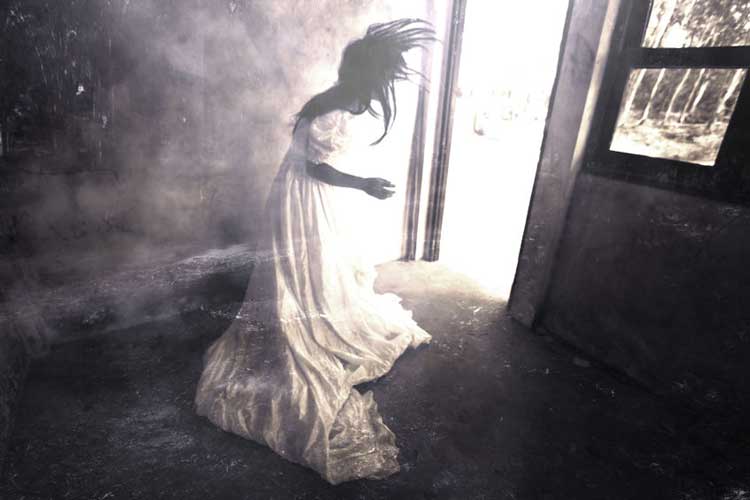
Her strong enchantments failing
Her towers of fear in wreck
Her limbecks dried of poisons
And the knife at her neck
The Queen of air and darkness
Begins to shrill and cry
"O young man, O my slayer
To-morrow you shall die."
O Queen of air and darkness
I think 'tis truth you say
And I shall die tomorrow;
But you will die to-day.


